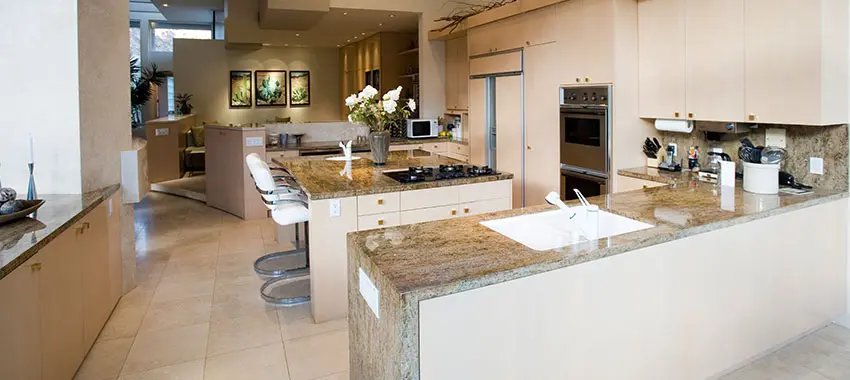
What Happens If You Don’t Seal Granite Countertops?
- Posted on
- FlintstoneCountertops
If you have been around natural stone countertops, you know you need to seal them to keep them looking their best, but have you ever asked yourself what happens if you don’t seal granite countertops? Here are some of the things that can happen:
Stains from food and grease
When you don’t seal your countertops, they tend to quickly absorb food and liquids, leading to deep stains. Since the countertops are bare, the stains develop within a matter of minutes, even if you are quick to wipe the spill.
The countertops not only absorb liquids, but grease and pigments as well. For example, if you leave a carton of strawberries on your countertops, it’s only a matter of a few minutes, and you find a large stain on your countertops that is hard to remove.
Stains from water
Properly sealed granite will repel liquids and prevent them from permeating into the stone. As mentioned above, an unsealed stone absorbs liquids fast, including water. You might have the impression that something as natural as water can’t harm your countertops, but this isn’t the case.
In an unsealed countertop, water will penetrate, leaving behind watermarks which give your stone an ugly, dirty appearance.
Damage from cleaning products
Vinegar and other harsh cleaning products will damage even the sealed surfaces, but unsealed countertops are more susceptible to damage. Since you haven’t sealed the surfaces, the products that aren’t supposed to harm the surfaces end up hurting them.
For example, products containing citrus quickly eat away at the countertop, seep into the stone and damage the finish, causing discoloration. When you seal the surfaces, you plug the cracks and tiny fissures in the stone, keeping the products from going deep into the stone. As a result you can clean the countertops without worrying about damaging them.
Sealing is straightforward
To keep your countertops in top shape, you should seal them at the time of installation then once a year thereafter. While countertop sealing is such an important task, it’s not complex.
Begin with finding a good quality countertop sealer designed to resist water and oil-based stains. Before you apply the sealer, clean the surfaces, and ensure there are no stains on them.
For best results, work in small areas, giving the sealer time to absorb into the slab before applying the second layer. After covering the entire surface, give the countertops a few hours to dry before using them.
Other ways to maintain granite
Other than sealing it, there are plenty of other things you need to do to ensure your countertop lasts for a long time. These things include:
Don’t step on the countertops
Granite is tough, but it can’t withstand a lot of pressure, especially along the edges. When you are looking to reach onto the top shelf, it’s tempting to step onto the countertops. After all, they are made from stone, right? At no time should you step on granite.
If you have to reach on to something on the top shelf, use a ladder or stool.
Don’t place hot items directly on the countertops.
Granite can withstand heat, but when you repeatedly place hot pans on it, you are bound to discolor it or even cause extensive damage. To ensure your countertops last for a long time, avoid placing hot pans, pots, and other items directly on the surfaces. Instead, use pads, trivets, and other protective materials.
Watch your cleaning products.
As mentioned above, even sealed countertops can get damaged by tough cleaning products, so stay away from them. As a rule of thumb, avoid products bearing acids as they will etch at the surfaces or even discolor your valuable surfaces.
Its recommend you use water and soap to clean the countertops. If the surfaces are too dirty and want to use other cleaning products, first enquire from the countertop company whether you can use it.
Don’t cut directly on the surfaces.
The same way certain homeowners have the impression the countertops are tough, so they can step on them, it’s the same way they think they can get away with cutting onions, meat, and other materials directly on them.
Granite companies Rockville strongly advise against this as it not only damages the countertops, but also your knife. When looking to cut anything on the surface, use a cutting board.

